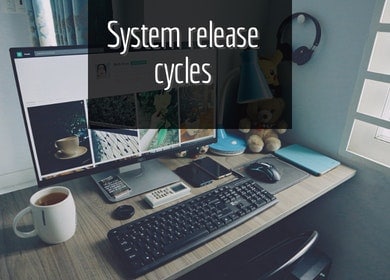When you find the right web hosting provider and finally start setting up your Linux server, the first thing you have to consider is what Operating System you want your server to run on.
While there are many Linux distributions out there with their own perks and quirks, when it comes to cheap Linux VPS hosting or any Linux hosting for that matter, the most popular choices are CentOS and Ubuntu.
Both are modeled after the same OS, but they have their differences. CentOS is a free, community-driven OS that is based on OS Red Hat Enterprise Linux, which is a paid OS designed for businesses.
……………………………………………………………
More tech articles
…………………………………………………………..
Meanwhile, Ubuntu is a Debian-architecture-based OS that has three official versions and multiple distributions. Although they both prioritize the same features, they have their differences.
Package management systems
 The first thing people notice is that their package management systems differ.
The first thing people notice is that their package management systems differ.
Ubuntu uses the Advanced Package Tool or APT for short, which is a high-level package manager for Debian-based systems. Not only does it handle all software installation and removal, but it also can perform system management tasks. Although it has no GUI, users can use the command line to control various tasks and configurations.
Now Ubuntu, which is widely used not only to operate cheap Linux VPS servers but other devices, too, employs the RPM Package Manager. It’s mainly used with Fedora-based distributions and handles low-level packages. It handles most of the same tasks as APT.
The difference between the two comes down to the availability of packages for the OSs. Not all packages available for RPM are available with APT as developers usually tend to stick to one type of package, either .deb or .rpm.
System release cycles
 When it comes to updates, CentOS doesn’t get updates at the same level of frequency as Ubuntu does.
When it comes to updates, CentOS doesn’t get updates at the same level of frequency as Ubuntu does.
Generally, Ubuntu even receives new software at a much faster rate when compared with the other system.
While you might consider choosing Ubuntu for your cheap Linux VPS server, you should consider the fact that CentOS’s every major release is maintained for a much longer period. Ubuntu gets new long-term support releases every two years and they are supported only up to five years while CentOS gets support for as much as 7-10 years.
Security & stability
 System release cycles are important as new updates ensure better security for your systems.
System release cycles are important as new updates ensure better security for your systems.
When it comes to protection, many choose CentOS as these infrequent but long-term updates mean what their servers will be a lot more stable. Longer cycles mean that the update is thoroughly checked for any errors and vulnerabilities, in turn making sure that the system is properly secured. Another point in CentOS’s favour is that it’s based on Linux Red Hat, which in itself has boosted security measures in place.
But for those that faster access to new applications is a priority, getting Ubuntu even for a cheap Linux VPS is a better choice. Because Ubuntu has a significantly bigger community of developers, any frequent updates that cause glitches, bugs, or errors can potentially be fixed a bit faster.
Ease of getting started
 Setting up a server isn’t exactly very easy to do so if you’re going to have to set everything up on your own, choosing the OS that is easier to implement becomes important.
Setting up a server isn’t exactly very easy to do so if you’re going to have to set everything up on your own, choosing the OS that is easier to implement becomes important.
Here, Ubuntu stands out because of its big community and the resources it offers to anyone wanting to start using Ubuntu distributions.
You can find such helpful sources as step-by-step guides and tutorials, and there’s plenty of developer support in various forums and communities filled with people ready to help set up a server.
CentOS also has similar help available for system and server set up but with a significantly smaller community size. For those that are willing to shell out more money, it’s fairly easy to find high-quality premium CentOS support.
Control panels
 It doesn’t matter if you’re using costly or cheap Linux VPS services, for most users, control panels define the whole experience of running a server. Control panel compatibility with these OSs becomes important, especially for those that are interested in becoming resellers and providing web hosting services for others.
It doesn’t matter if you’re using costly or cheap Linux VPS services, for most users, control panels define the whole experience of running a server. Control panel compatibility with these OSs becomes important, especially for those that are interested in becoming resellers and providing web hosting services for others.
In this case, CentOS stands out because it’s compatible with one of the most popular control panels out there – cPanel. cPanel has an intuitive GUI, is pretty easy to manage server tasks with, and is a comfortable platform for reseller hosting, thus making CentOS the go-to choice for many users setting up servers.
Both CentOS and Ubuntu have their quirks and in certain areas, one is slightly better than the other. Overall, they are good OSs. When it comes down to the aspects discussed here, users that want the latest features for their server and large community with lots of support should go for Ubuntu.
For those that don’t require frequent updates and prefer using cPanel then CentOS is a great choice.
Whitepaper: How to Improve Your Account-Based Marketing https://t.co/N6AdFDNKPq
This white paper has everything you need to know about Account-Based Marketing (ABM) and will explain how personalizing your messages and content will improve your ABM results. pic.twitter.com/3Hg86yNc3B— Will Corry (@slievemore) April 17, 2020

